2014 Scotiabank Giller Prize Winner
Sean Michaels
Us Conductors
2014 Shortlist
The 2014 Scotiabank Giller Prize jury announced its shortlist on Monday, October 6, 2014, derived from a longlist of 12 books. The jury read an astonishing 161 works of fiction this year, submitted by 63 publishers from every region of the country.
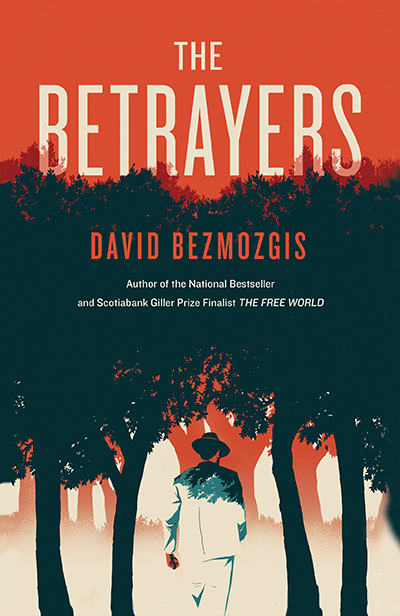
The Betrayers by David Bezmozgis
Biography
David Bezmozgis moved from Latvia to Canada at the age of six. He studied English literature at McGill University and fine arts at the Southern California School of Cinematic Arts. Natasha and Other Stories, his debut collection, won the Commonwealth Writers’ Prize for Best First Book (Canada and Caribbean region), the Canadian Jewish Book Award, and the Toronto Book Award; was a finalist for a Governor General’s Literary Award for Fiction and CBC’s Canada Reads; and is being made into a feature film. His first novel, The Free World, won the Amazon.ca First Novel Award and the Helen and Stan Vine Canadian Jewish Book Award, and was a finalist for the Scotiabank Giller Prize, the Governor General’s Literary Award for Fiction, and the Trillium Book Award. In 2010, Bezmozgis was named one of The New Yorker’s “20 Under 40” writers. He lives in Toronto.
Jury Citation
The extraordinary feat of David Bezmozgis’s fine novel is to have captured in one day a whole universe of betrayal and morality. There are two betrayers in the story; the first is Baruch Kotler, an elderly and well-known figure in Israel, who has betrayed his wife by taking his much younger lover on a sentimental journey to Crimea. He was betrayed in Russia forty years ago by a KGB agent, himself Jewish. David Bezmozgis has a dazzling talent, is the possessor of that rarest of skills – the ability to create fiction which is intensely serious but which also vividly encompasses the absurdity and comedy of life.
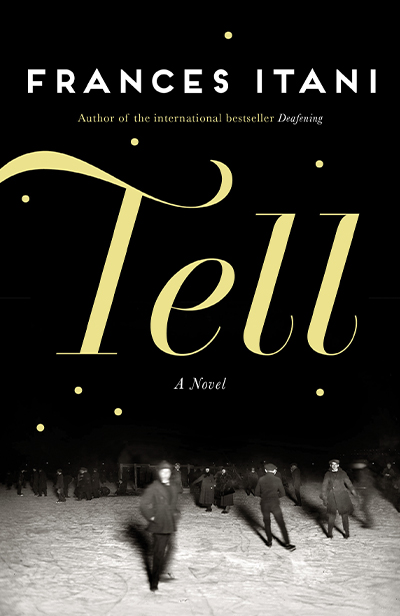
Tell by Frances Itani
Biography
Frances Itani has written sixteen books. Her novels include Requiem, chosen by the Washington Post as one of the top fiction titles for 2012; Remembering the Bones, published internationally and shortlisted for the Commonwealth Writers’ Prize; and the #1 bestseller Deafening, which won a Commonwealth Writers’ Prize and was shortlisted for the International IMPAC Dublin Literary Award, selected for CBC’s Canada Reads and published in seventeen territories. A Member of the Order of Canada and a three-time winner of the CBC Literary Award, Itani lives in Ottawa.
Jury Citation
Every word feels simple, right, and natural in Frances Itani’s Tell. You’re slowly immersed in the mystery: Who gave up a baby for adoption, and why? Itani peels back time to show us Kenan, a damaged and disfigured WWI soldier readjusting to life in Ontario, and his marriage to Tress. Itani inhabits many voices with ease, pathos and humour. Her choice of details expertly builds our understanding of her characters’ times, foibles and moral choices, and she connects them in a hugely satisfying ending. Tell is a treasure: serious with humorous moments, potent and controlled, subtle yet deeply moving.
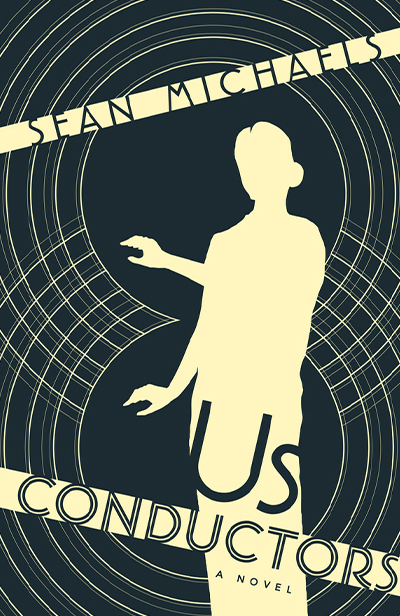
Us Conductors by Sean Michaels
Biography
Sean Michaels was born in Stirling, Scotland, in 1982. Raised in Ottawa, he eventually settled in Montreal, founding Said the Gramophone, one of the earliest music blogs. He has since spent time in Edinburgh and Kraków, written for the Guardian and McSweeney’s, toured with rock bands, searched the Parisian catacombs for Les UX, and received two National Magazine Awards.
Jury Citation
Michaels’s book is based on the life of Lev Thermen, the Russian-born inventor of the Theremin, the most ethereal of musical instruments. As the narrative shifts countries and climates, from the glittery brightness of New York in the 1920s to the leaden cold of the Soviet Union under Stalin, the grace of Michaels’s style makes these times and places seem entirely new. He succeeds at one of the hardest things a writer can do: he makes music seem to sing from the pages of a novel.
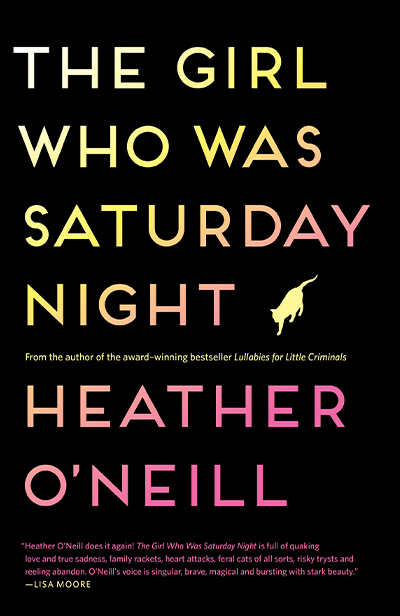
The Girl Who Was Saturday Night by Heather O'Neill
Biography
Heather O’Neill’s first novel, Lullabies for Little Criminals, earned accolades around the world, including being named winner of Canada Reads 2007 and the Hugh MacLennan Prize for Fiction, and being a finalist for the Governor General’s Award for Fiction and the Orange Prize. She is a regular contributor to CBC Books, CBC Radio, National Public Radio, The New York Times Magazine, The Gazette (Montreal) and The Walrus. She was born in Montreal, where she currently lives.
Jury Citation
The Girl Who Was Saturday Night describes what it is like to be young and to have a lifetime of experience and grief already behind you. Even as it gives us a cast of vibrant, funny, tragic, sharply drawn characters, O’Neill broadens her focus to portray the political climate in Quebec at the time of the 1995 referendum and to give us a sense of why, in the words of her narrator, the daughter of an iconic Québécois singer, there is something “distinct,” something “weird and special” about us.

All My Puny Sorrows by Miriam Toews
Biography
Miriam Toews is the author of five previous bestselling novels: Summer of My Amazing Luck, A Boy of Good Breeding, A Complicated Kindness (Canada Reads 2006, Canada Reads Canadian Bestseller of the Decade 2010), The Flying Troutmans, and Irma Voth, and one work of non-fiction, Swing Low: A Life. She is a winner of the Governor General’s Award for Fiction, the Libris Award for Fiction Book of the Year, the Rogers Writers’ Trust Fiction Prize, and the Writers Trust Marian Engel/Timothy Findley Award. She lives in Toronto.
Jury Citation
This is a novel of great subtlety and insight. Toews has an exceptional talent for observing life as we live it in our time. Her book, based around the bond between two sisters, one of whom is bent on suicide, is a deep and affecting portrait of love, loyalty and reckoning. Out of this material, Toews brilliantly crafts a novel of a family in disarray. Despite the darkness of the subject matter, All My Puny Sorrows is both serious and outrageously funny. Do not be misled; this is art masquerading as light fiction.

The Ever After of Ashwin Rao by Padma Viswanathan
Biography
Padma Viswanathan is a Canadian fiction writer, playwright and journalist, whose debut novel, The Toss of a Lemon, was shortlisted for the Amazon.ca First Novel Award, the Commonwealth Writers’ Prize Best First Book Award (Canada and the Caribbean) and the PEN USA Fiction Award, and published to international acclaim. Her work has received many awards, including fellowships from the National Endowment for the Arts and support from the Canada Council, as well as residencies at the MacDowell Colony, the Banff Centre and the Sacatar Foundation. Her hometown is Edmonton, Alberta, though she is presently living with her husband, Geoffrey Brock, a poet and translator, and their two children in Fayetteville, Arkansas.
Jury Citation
Scotch-drinking, McGill-educated psychologist Ashwin Rao wrote about those bereaved by India’s state-sponsored anti-Sikh pogrom of 1984. In 2004, he returns to Canada researching another book on comparative grief, attending the trial over the 1985 bombing of Air India 182, a bombing that claimed 329 lives, including his sister and her children. Guided by Viswanathan’s ever-compassionate gaze, and her ability to render a polyglot world in English, Ashwin meets Canadians affected by the tragedy, some as complex as himself. This often droll, fiercely intelligent novel with its cat’s-cradle of a plot challenges the twin deadly lures of religious fundamentalism and racism, revealing the learning and unlearning at the core of the immigrant experience.
2014 Longlist
The 2014 Scotiabank Giller Prize jury announced its longlist on Tuesday, September 16, 2014. The jury read an astonishing 161 works of fiction this year, submitted by 63 publishers from every region of the country.
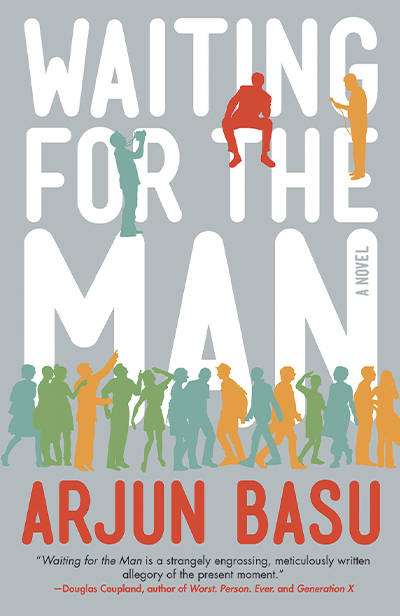
Waiting for the Man by Arjun Basu
But it would never last.
I would be in a meeting, again, thinking up ideas and products, dreaming up the inconsequential things that make the world go round. Thinking up the reasons and pathways and trajectories of desire. Creating desire. And I would leave the meeting. And then I would return. I would hover above myself and observe my own ticks and mannerisms and then return to the normal operations of things. This began happening with an alarming kind of regularity.
It was the floating that started me off. The dreams didn’t come until later. And by the time the dreams took over, I was well on the path. My road. To wherever. To this place.
But I’m getting ahead of myself.
I’m a simple person. Everything follows from this truth. Simplicity is a state in which my life has been lived. I grew up in a fake Tudor home in the deepest suburbs of New Jersey, the only child of immigrant parents. I went to a good high school; achieved good grades; attended college; got the degree; landed a safe, conventionally challenging, well-paying, and vaguely sexy job in advertising. Our next-door neighbor knew some people at a boutique agency and helped me get the position. I moved to Manhattan. I was creative. I could make people laugh. I was sufficiently cynical. Engagingly sarcastic. It’s the only job I’ve ever had. The only one I remotely wanted. My father never made me work while I was in school. He wanted me to get good grades. I missed out on flipping burgers, working as a lifeguard, selling shoes, rites of passage in my community. Learning exploitation as a child is a license for abhorrent behavior in the future, I think. I missed that. Being exploited. I worked long hours at the agency, the kind of schedule that precludes a social life. I jumped into this thing and I never thought much about it. I was relatively successful. I was good at thinking up ways to sell things to people. To consumers. To instill want where there had been none. To make the essence of a brand match the core of your being.
I wasn’t the kind of person who defined himself by his work. I didn’t know many people who did and the ones who did were all older. There is a generational divide in this kind of self-definition, though the quality of the work has more to do with it. Perhaps in our age, there are more jobs but more bad jobs as well. When asked, I did not tell people I was a copywriter or in advertising. Even to the question of “What do you do?” I would describe myself as a frustrated Mets fan, as a drinker of a particular beer, as a lover of uncommon passion. I was sarcastic. I answered this question, as common in this city as “Hello,” with sarcasm. I’m not sure if that was shame or a defense mechanism of some sort. It was a sign, surely. What else could it have been?
My work was something that should have offered more. Perhaps I should have accepted what it had to offer. For a long while I did. And it rewarded me very well. And this sense of reward, and the obviousness of it, protected me from the real world. From the real world as it existed around me. I worked within an energy, the kind of energy that came from satisfaction, youth, and the knowledge that we were going to survive the recession, or whatever it was being branded lately, because we were small and nimble and successful.
I was without a plan, I did as I was told, I showed the proper level of ambition. I drank with the right people. I received promotions and raises and these things made me work harder. I figured this was the key to the system. To how things functioned. The circle of life. It’s an instinctual way to live. We live unimpressive lives in order to be impressive. And we do impress people. That’s the thing. And when we stop treating this with any kind of amazement, one can feel the confirmation of a successful career. One can have things, be the person, wear the clothes. We win. And that’s what matters in the end. Winning. Ensuring that everyone knows you have won.
—
Excerpted from WAITING FOR THE MAN by Arjun Basu. Copyright © Arjun Basu, 2014. Excerpted by permission of ECW Press. All rights reserved. No part of this excerpt may be reproduced or reprinted without permission in writing from the publisher.

The Betrayers by David Bezmozgis
One
A thousand kilometers away, while the next great drama of his life was unfolding and God was banging His gavel to shake the Judaean hills, Baruch Kotler sat in the lobby of a Yalta hotel and watched his young mistress berate the hotel clerk — a pretty blond girl, who endured the assault with a stiff, mulish expression. A particularly Russian sort of expression, Kotler thought. The morose, disdainful expression with which the Russians had greeted their various invaders. An expression that denoted an irrational, mortal refusal to capitulate—the pride and bane of the Russian people. That Leora persisted in arguing with the girl proved that she was the product of another culture. In Israel, notoriously obstinate country, argument could be sport, sometimes engaged in for its own sake, sometimes to accomplish something. But this Levantine penchant for argument was of no use in a Crimean hotel at high season. Much had changed, Kotler observed—the very existence of this modern hotel and a few others like it; the vacationers in their Western fashions and their brash, contemptuous, cheerful, money-nduced postures; all the visible appurtenances of progress and prosperity — but at the root, where it mattered, there was no change. One had only to look at the Russian girl’s face. A people’s mentality, this hard nut, mysterious and primitive, resisted change. Yet to espouse such a view was now considered provocative, and it was precisely this sort of provocative thinking that had landed him in his predicament, Kotler thought gravely — but not without a twist of ironic satisfaction.
Leora spun away from the registration desk and strode over to Kotler. He regarded her as she approached, a strong-minded Jewish girl, dark curls flying, black eyes fierce with indignation, her solid, compact figure radiating rebuke. Perhaps someone could think, considering them, that here was a dutiful daughter vacationing with her father. But wasn’t that yet another of the changes, the increased number of daughters and fathers who seemed to be vacationing together?
—The cow says they have no record of our reservation, Leora announced. An outright lie. I was tempted to tell her whom she was dealing with.
—I’m sure it would have made a profound impression.
—I wouldn’t be so dismissive of your importance.
—Well, there’s something I’ve seldom been accused of, Kotler said.
—I don’t find this nearly as amusing as you do.
—All right, Leora, what do you propose we do? Write an open letter, stage a hunger strike?
Each trailing a suitcase, they stepped from the coolness of the marble lobby into the bright glare of the esplanade. In his disguise of white Borsalino hat and dark sunglasses, Kotler blinked out at the tourists who flowed past, the waiters who raced among tables at a café nearby, and the customers who beset the souvenir booths along the stone wall. Beyond which: the sea and the sunbathers on the gray pebble beach. So how much had really changed? Kotler thought. Fifty-three years ago, had the picture been so very different? There’d been no modern hotels, and the offerings at the cafés and souvenir booths hadn’t been quite so eclectic, but there had still been plenty to enchant a ten-year-old boy. Kotler recalled the open-air concerts, the hikes with his father in the surrounding hills, the excursions to the Greek ruins and the Italian fortress, and the long, aimless, scorching days at the beach. They had spent an entire month this way, he and his parents, their only such time together. In the scheme of his family’s story, this one month assumed a legendary, halcyon quality. They never succeeded in repeating it. The following summer, his mother had a terrible appendicitis scare. The summer after that, his father switched jobs. And after that, Kotler’s vaunted musical aspirations interceded. His parents agreed that he shouldn’t spend so much time away from his piano lessons. The great Myron Leventhal consented to take him on, and Kotler traveled for the first time to Moscow. And after that, it was too late. There was always something else he preferred to do. When he wasn’t preoccupied with his studies, he was preoccupied with friends, with girls, and eventually with politics. In retrospect, given the way their lives unfolded, what a shame it was that they never managed to return to Crimea.
Kotler and Leora paused outside the hotel to adjust to their surroundings and circumstances. Leora gazed at the neighboring hotels.
—There’s no point, Kotler said, following her gaze. When I called yesterday, they told me I was getting their last room. It’s August. The town is booked up. Everywhere here we’ll get the same answer.
—
Excerpted from THE BETRAYERS by David Bezmozgis. Copyright © 2014 by Nada Films, Inc. Excerpted by permission of HarperCollins Publishers Ltd. All rights reserved. No part of this excerpt may be reproduced or reprinted without permission in writing from the publisher.
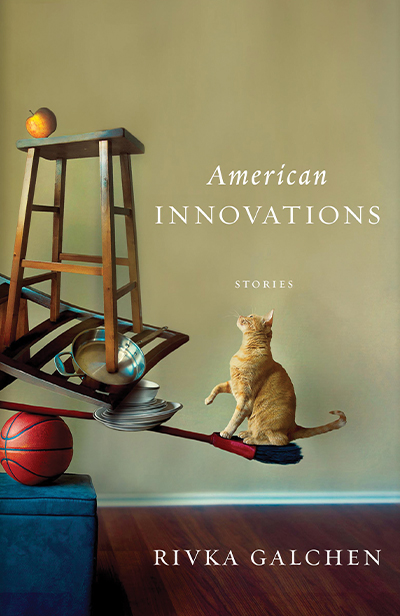
American Innovations by Rivka Galchen
I was at home, not making spaghetti. I was trying to eat a
little less often, it’s true. A yogurt in the morning, a yogurt at
lunchtime, ginger candies in between, and a normal dinner. I don’t think of myself as someone with a “weight issue,” but I had somehow put on a number of pounds just four months into my unemployment, and when I realized that this had happened — I never weigh myself; my brother just said to me, on a visit, “I don’t recognize your legs” — I wasn’t happy about it. Although maybe I was happy about it. Because at least I had something that I knew it wouldn’t be a mistake to really dedicate myself to. I could be like those people who by trying to quit smoking or drinking manage to fit an accomplishment, or at least an attempt at an accomplishment, into every day. Just by aiming to not do something. This particular morning, there was no yogurt left for my breakfast. I could go get some? I could treat myself to maple. Although the maple yogurt was always full cream. But maybe full cream was fi ne, because it was just a tiny—
My phone is ringing.
The caller ID reads “Unavailable.”
I tend not to answer calls identified as Unavailable. But sometimes Unavailable shows up because someone is calling from, say, the hospital.
“One garlic chicken,” a man’s voice is saying. “One side of salad, with the ginger- miso dressing. Also one white rice. White, not brown. This isn’t for pickup,” he says. “It’s for delivery.”
He probably has the wrong number, I figure. I mean, of course he has the wrong—
“Not the lemon chicken,” he is going on. “I don’t want the lemon. What I want—”
“OK. I get it—”
“Last time you delivered the wrong thing—”
“Lemon chicken—”
“Garlic chicken—”
“OK—”
“I know you,” he says.
“What?”
“Don’t just say ‘OK’ and then bring me the wrong order. OK, OK, OK. Don’t just say ‘OK.’ ” He starts dictating his address. I have no pencil in hand.
“OK,” I say. “I mean, all right.” I’ve lost track of whether it was the lemon chicken or the garlic he wanted. Wanting and not wanting. Which tap is hot and which is cold. I still have trouble with left and right.
“How long?” he asks.
“Thirty minutes?”
He hangs up.
Ack. Why couldn’t I admit that I wasn’t going to be bring- ing him any chicken at all? Now I’m wronging a hungry man. One tries not to do too many wrong things in life. But I can’t call him back: he’s Unavailable!
Just forget it.
—
From AMERICAN INNOVATIONS by Rivka Galchen. Copyright © 2014 by Rivka Galchen. Excerpt reproduced with the permission of HarperCollins Publishers Ltd by arrangement
with Farrar, Straus and Giroux, LLC. All rights reserved. No part of this excerpt may be reproduced or reprinted without permission in writing from the publisher.

Tell by Frances Itani
Zel glances around the room: oak floor, oak desk, wooden cabinet, two windows that look down over city streets three storeys below. Shelves behind the desk are stuffed with black binders. These, she suspects, are guarding secrets stored for generations.
She is in this room with three other women, a man and a baby. The baby, six weeks old, sleeps while nestled against her mother’s arm. Papers are arranged neatly before a woman who wears a tailored jacket over a grey dress. Zel sees compassion on her face; she senses it from her manner and her voice. A brooch in the shape of a miniature sleigh, with silver slats and curved gold runners, is pinned to the woman’s jacket. A tiny gold chain droops from the crossbar to represent a rope attached to the front of the sleigh. It’s as if the woman, who has introduced herself as Mrs. Davis, has a playful side, though not here, not as the official who will ensure that the documents on her desk are duly signed. In other circumstances, Zel would ask Mrs. Davis about the brooch, its origins, its maker.
A low rumble from the street railway outside seems far off, though sounds are muffled because the windows in the room are sealed. Tracks are being laid on nearby city streets, and in some areas it is difficult to cross from one side to the other. After a rain, the roads here must be a morass of mud, Zel thinks, and she looks down at her boots as if she will have to shake them later, dust them off. Earlier, from inside the cage of the ascending elevator, she glimpsed, as she passed the second floor, rows of women at sewing machines, whirring spools, strewn garments spread over long tables in a large, open room. She had already noticed the sign outside advertising LADIES’ WHOLESALE LINENS, and her fingers itched to manipulate folds of material on her own work table at home. There had been no advertisement for the office used by adoption officials, only a number beside the door at street level, which matches the number of the room where everyone is now tensed, waiting for the proceedings to end.
The woman who holds the sleeping baby is thin, green-eyed, taut with nerves. Her arms have begun to tremble and she rearranges the baby’s knitted blanket in an attempt to disguise the shaking left hand she can barely control as she leans forward to sign. Zel moves quickly to stand behind, to place her hands on the woman’s shoulders. To help her through this moment, this day. The baby stretches. A small fist is raised to her plump cheek; there is a tiny indent like a star in her fist. She does not wake.
The young couple rise together and now, as parents, receive the baby. They cannot hide their joy, their happiness at leaving with this new and precious daughter. Each of them embraces the woman who has given up her child. The two do not linger; they are first to exit the room. The baby, still sleeping, has shown no sign that her life has been set, this very moment, on a new path.
Zel watches the young man tilt his cap over his forehead as he steps through the doorway, shadowing his face before he returns to street level. There are many such men on the streets below, now that everyone is back from the war.
The three women who remain sit in silence, their thoughts perhaps stretching back to earlier moments in each of their lives. A noon whistle pierces the air from somewhere inside the building. Footsteps can be heard in the sewing room on the second floor. Feet clatter down the stairs to the street below as workers take their midday break. Mrs. Davis pushes back her chair and rises to her feet. She nods to Zel and then extends her hand to the mother, who has already begun to feel the physical absence of her child as if it were a spectre that has insistently returned to fill out its former shape.
“You have a long journey ahead,” says Mrs. Davis, “if you’re to travel across the lake to Oswego today.” She adds, as if she has said this too many times to too many women, “Try not to look back. It will be easier if you don’t. Put your efforts into moving your life forward.” She goes to the window and looks down. The sleigh’s golden chain sways slightly with her movement. “Somehow,” Mrs. Davis says, as if the words have been cut from the cloth of her own experience, “somehow, we manage to survive.”
—
Excerpted from TELL by Frances Itani. Copyright ©2014 by Itani Writes Inc. Excerpt reproduced with the permission of HarperCollins Publishers Ltd. All rights reserved. No part of this excerpt may be reproduced or reprinted without permission in writing from the publisher.
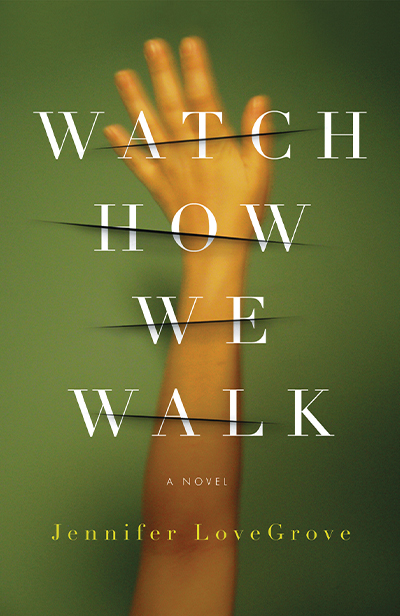
Watch How We Walk by Jennifer LoveGrove
THE FIRST LINE WAS SMALL, timid, and red. I was scared, but it was the only way through. I breathed deeply and drew the line longer, pushed harder, and it bloomed.
It hurt. I clenched my teeth, then smiled.
I etched another line, perpendicular to the first. It burned, clear and pure, both pain and pleasure, sheer release. Red beaded and dripped down my arm, but I didn’t look away. Compared to everything else that had happened, it was nothing.
I clenched my fist tight, then opened it. Something surged through my veins — a warm rush, a high, and then, exquisite release.
I stretched out my arm and admired my newfound craft. A perfect red letter L.
It seemed only natural to discuss it with her, and just as normal when she responded.
What do you think? Pretty, isn’t it?
Little poppies, little hell flames.
Do you like it?
No. You’re a freak. Better do what I say. Or I’ll tell.
Footsteps padded above me and stopped at the door. Someone was listening. I shoved my tools in the drawer and switched off the lamp. I sat still and silent, trying not to move or even breathe, willing myself invisible.
WHEN I WAS A LITTLE GIRL and people asked me what I wanted to be when I grew up, I said what everybody else said: a Full-Time Pioneer. That’s what we were all supposed to be — obedient brothers and sisters who spent all their time going from house to house, knocking on doors, spreading the Armageddon virus. The people would smile and nod in approval, at me, then at my parents, then back at me, their joyous, too-bright heads bobbing in a sea of Pharisees.
At the meetings — Tuesday nights, Thursday nights, and Sunday mornings — I would sit down, cross my legs, smooth my skirt, and open the latest issue of The Watchtower. We’d all read it together and answer questions about it, sing some songs, and pray. I thought it would be like this until Jehovah took over and killed everybody else off, and gave us — the loyal sheep, on the right hand of God — eternal life in Paradise on Earth.
If I hadn’t finally figured out things were not what they seemed, I might still be there, sitting in the Kingdom Hall, waiting.
AS A TEENAGER, I DEVELOPED something like claustrophobia, but it happened mostly when I was alone. Thoughts would rush my brain and keep coming and coming, one after another, thoughts of Uncle Tyler, of Lenora, and it would overwhelm me and I couldn’t breathe. It was the house, I told myself, the same old creaking house, and I needed to escape. I still lived at home then, with my parents making all the decisions, in the same town where the elders seemed to be perpetually peering over our shoulders. Every day, the walls inched toward each other, closing me in.
It began with the house, but then I became claustrophobic within my own skin. Hunger, exhaustion, cold, pain, even pleasure — all of them had abandoned me. I felt nothing. A chrysalis of numbness had grown thick around me. If I spoke, my voice sounded distant, and when I listened to others — at school or at the Hall — it was as though I was under water. If my parents forced me to eat, I picked at the pasta or grilled cheese on my plate but I tasted nothing. That was just as well; I had also developed a paralyzing fear of throwing up. I would go to great lengths to avoid germs, gagging, and even the vaguest mention of vomit. Sometimes I would dream that I was about to throw up, and I would jolt awake just in time, shivering and panicked. Then I would recede back into numb immobility. I was a prisoner in my own body, trapped no matter where I was or what I was doing. I started to wonder if I even existed anymore.
One fall day at school I sat and alternately stared at the teacher or down at my books while I pinched the insides of my arms. Purple bruises blossomed. By 3:00, I had four of them on each arm, evenly spaced apart.
I started to feel more alert then, and by the time I got home, I had come up with a way to get outside of the haze of myself, to escape the thick fog around me, and find her, my sister, and bring her back home.
—
Excerpted from WATCH HOW WE WALK by Jennifer Lovegrove. Copyright © Jennifer LoveGrove, 2013. Excerpted by permission of ECW Press. All rights reserved. No part of this excerpt may be reproduced or reprinted without permission in writing from the publisher.

Us Conductors by Sean Michaels
I WAS LEON TERMEN before I was Dr Theremin, and before I was Leon, I was Lev Sergeyvich. The instrument that is now known as a theremin could as easily have been called a leon, a lyova, a sergeyvich. It could have been called a clara, after its greatest player. Pash liked “termenvox.” He liked its connotations of science and authority. But this name always made me laugh. Termenvox—the voice of Termen. As if this device replicated my own voice. As if the theremin’s trembling soprano were the song of this scientist from Leningrad.
I laughed at this notion, and yet in a way I think I also believed it. Not that the theremin emulated my voice, but that with it I gave voice to something. To the invisible. To the ether. I, Lev Sergeyvich Termen, mouthpiece of the universe.
That mouthpiece is now atop the sea, aboard a ship, in a rectangular cabin the size of an ensuite bathroom at New York’s Plaza Hotel, the hotel that was once my home. This vessel is called the Stary Bolshevik. The walls are made of steel and painted
eggshell blue. There is a cot in the corner, a frayed grey rug on the floor, and I sit in a folding chair before a desk that is also made of steel, also painted eggshell blue. The bare light bulb glows. When the weather is rough, as it is now, I am as sick as a dog. I clutch my sides and listen to the drawer beside my bed sliding open and slamming shut and sliding open. The room rocks. I go to the toilet in a tiny closet, and then I come back and stare at what I have written. Rows of symbols — qwe asd zxc, the the the, lt, cr, lt, cr (((((((((&. I wonder who will see these pages. Will I send them away, like a letter? Will I keep them in a safe? Will they drown one night, in seawater?
On the other side of the hall there is another room like this one, lit by its own incandescent bulb. It is filled with my equipment. Some of this equipment is delicate and easily damaged. When the waves heave, it would be reassuring to go across and unfasten the cases’ clasps, check that all the wires are coiled, the batteries capped, the tubes intact. Check that my theremins still sing. For the last seventeen years, a day has rarely passed that I did not hear their sound. From Archangelsk to New Haven, in palaces and shacks, I travelled and taught, performed for longshoremen and lords, and almost every night I was able to reach across the room and find the electrical field of one of my humble theremins, coaxing current into sound.
But the door to my cabin is locked. I do not have the key. Just a typewriter, just paper and ink, just this story to set down now, in solitude, as the distance widens between us.
—
Excerpted from US CONDUCTORS by Sean Michaels. Copyright © 2014 Sean Michaels. Excerpted by permission of Random House Canada. All rights reserved. No part of this excerpt may be reproduced or reprinted without permission in writing from the publisher.
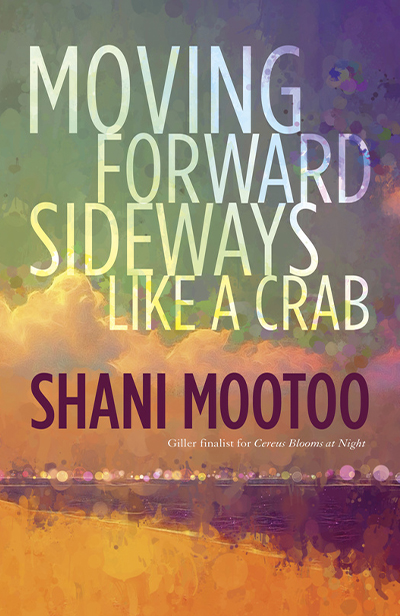
Moving Forward Sideways Like a Crab by Shani Mootoo
Surely it is a failure of our human design that it takes not an hour, not a day, not much, much longer to relay what flashes through the mind with the speed of a hummingbird’s wing.
There is so little time left now, and what Jonathan wants to know and I to say are not the same.
I realize Jonathan is a grown man and can surely take whatever words I offer him, but what good would come of it if I were to tell him how, ten years into my relationship with his mother, India, she informed me that I was a disappointment? I would not want to encourage him to consider this, lest in doing so he concur.
Nor does he need to know that there was a time after his mother and I first met, when India would ask after our lovemaking, “How did you know to do that?” Does he need to know that she gripped my shoulders and trembled?
Or, should he know? I would if he would believe it.
He certainly doesn’t need to know that after his birth, India and I grew cool with each other. And yet, nearly ten years later when we broke apart, I hadn’t stopped loving her. Should he know that? He would likely scoff at this pathetic admission. It might even appall him.
After India and I first met, in the months before I moved into her house I saw my physical upkeep as part of a daily drama between her and me, and I made a job of keeping my body trim and groomed, my clothing and sheets washed and pressed, my shoes polished, my kitchen and bathroom clean and tidy, wine in the fridge and chocolate on my bedside table.
Ten years later, the list of what, it turned out, I was inept at doing included: organizing and cleaning the parts of the house where Jonathan and I spent time; enjoying myself – or at least, giving the appearance of such – at parties thrown by her publisher and by various literary festivals. I didn’t make well enough of myself as an artist to be recognized by her peers. I failed to take Jonathan away often enough or long enough that she could have time to write. I indulged Jonathan too much.
My rendition of our rupture is, of course, one-sided, perhaps a little flippant, the rewriting of cold facts encouraged by time and distance. I once asked her, “And you and me?” To which her response was a gesture of her hand towards and down the length of my body, a delicate non-verbalization of waning desire. After this, the relationship could not be sustained. It was India who spoke the words first, and a short time later, declaring the obvious was as good as insisting upon it. Over the course of a few months we became territorial, keeping our belongings, our agendas, our thoughts to ourselves.
—
Excerpted from MOVING FORWARD SIDEWAYS LIKE A CRAB by Shani Mootoo. Copyright © Shani Mootoo 2014. Published by Doubleday Canada, a division of Random House of Canada Limited, a Penguin Random House Company. Reproduced by arrangement with the Publisher. All rights reserved.

The Girl Who Was Saturday Night by Heather O'Neill
Girls! Girls! Girls!
I was heading along Rue Sainte-Catherine to sign up for night school. There was a cat outside a strip joint going in a circle. I guessed it had learned that behaviour from a stripper. I picked it up in my arms. “What’s new, pussycat,” I said.
All the buildings on that block were strip clubs. What on earth was their heating bill like in the winter? They were beautiful, skinny stone buildings with gargoyles above the windows. They were the same colour as the rain. There were lights blinking around the doors. You followed the light bulbs up the stairs. They were long-life light bulbs, not the name-brand kind. The music got louder and louder as you approached the entrance of the club, like the music in horror films.
Cars filled with American boys would come up to see the girls, girls, girls on the day the boys turned eighteen. The boys from Ontario came in on the train and slept nine to a hotel room downtown. Because you could do anything you wanted with the Québécois girls. You could stroke their asses. You could lick their privates with everyone watching. You could take them behind a little curtain and fuck them while wearing bright blue condoms that the girls could keep their eyes on.
The girls were backstage, getting ready. Their big toes were getting stuck in their fishnets. Their yellow ponytails were being put up lopsided. They were putting on too much makeup. Their bangs were in their eyes. Their tummies folded over the elastic bands of their underwear. One was wearing big glasses because she’d lost her contact lenses. One drank a glass of water that made her feel cold inside, and she wondered if she was going to have a bladder infection. And one of the girls yawned, and everything is so catching in these clubs that everyone started yawning and yawning.
The ones who had been dancing awhile looked like Barbie dolls with their muscles and knee-high boots and their no-nonsense attitude. They were like superheroes. The new girls showed up onstage with inappropriate underwear and bikini bottoms and high-heeled shoes a size too big. One eighteen-year-old girl was wearing a sailor hat from her grandfather’s closet in Saint-Jérôme. She’d been raised for this life, whether anyone wanted to admit it or not.
We were all descended from orphans in Québec. Before I’d dropped out of high school, I remembered reading about how ships full of girls were sent from Paris to New France to marry the inhabitants. They stepped off the boat with puke on their dresses and stood on the docks, waiting to be chosen.
They were pregnant before they even had a chance to unpack their bags. They didn’t want this. They didn’t want to populate this horrible land that was snow and rocks and skinny wolves. They spoke to their children through gritted teeth. That’s where the Québec accent came from. The nation crawled out from between their legs.
—
Excerpted from THE GIRL WHO WAS SATURDAY NIGHT by Heather O’Neill. Copyright © 2014 by Heather O’Neill. Excerpted by permission of HarperCollins Publishers Ltd. All rights reserved. No part of this excerpt may be reproduced or reprinted without permission in writing from the publisher.
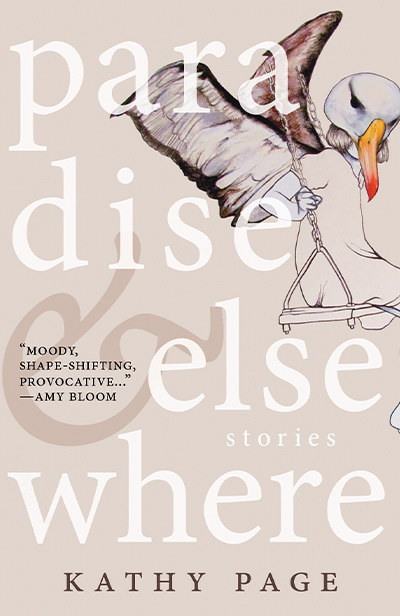
Paradise and Elsewhere by Kathy Page
The village looks closer to the road than it is and I see them coming from a long way off, their clothes bright white against the mud and the scrub of the plain. Most often it is a man and a woman together like this; the man has a camera, and both of them wear money belts around their waists. When they reach the path I slip down from the wall. I watch them coming around the twist in the path; they see me, and I smile.
The woman wears big dark glasses: some years the glasses are big, some years small. She carries a plastic bottle of water. You can see the shape of her body beneath her clothes, the damp patches under her arms. The man is thin. He is beginning to go bald, and although he moves loosely he stoops from being tall. He doesn’t wear sunglasses and there are lines on his face, whiter than the rest. He smiles right back when he sees me. Normally it is the woman, but today, he is the one, and so we begin:
“I offer you a good afternoon.”
“To you also,” the man replies: he has some of our language, then, but it will not be so much as I have of his. I offer my hand to shake, first to him then to her. The woman makes a noise in her throat. She flaps her other hand around to chase away the small brown flies that come at this time of year; it only makes them worse, but foreigners never see this.
“My name is Aeiu,” I tell them. Theirs are Nick and Liz. And now we have made an exchange, which prepares the ground.
“It is beautiful here,” she says. truly, I don’t know if it is or it isn’t beautiful. There is earth, sun, water, trees. There could be hundreds of places like this.
“Very beautiful,” I tell them, as they nod and agree. “And your wife,” I say to the man, “she is like a gazelle.” And then we walk together, on towards the village.
I am sixteen but I look less so I tell them twelve. I have two younger brothers and one older and one sister, not married. My father’s brother is a holy man who does not have to work—people bring him gifts of food and drink—but the rest of us start with the sunrise. I tell them this and they nod hard again when they understand and say “Good.” It is not particularly good, it is how things are, here in G’ming, where I live. Though I do not say that.
The mud walls rise higher either side of the track and as we come into the village, the shade grows deeper. Branches hang over the walls, heavy with fruit. The man and the woman look around with big eyes. But they don’t look behind and neither do I. I know without looking that by now the others, the little ones, are following us.
“These are pomegranates.” I pick one for the woman. “To quench your thirst. Perhaps you would like to buy a basketful? or maybe some of our pottery, all very cheap.”
“We are just walking, thank you,” she says. “We are not buying.” We come to the centre of the village, where all the paths meet in a star, which is the marketplace every week, busy, busy, busy. But now it is quiet. The sun is almost overhead, no shade, no sounds. They hesitate, aware of the stillness, and then the boys who have been following break suddenly upon us, laughing and shouting.
It would make a good photograph: the two tall ones, the twenty or so smaller ones, somewhere between their knees and their hips in height, jostling, reaching up. Hands to shake. Lots of shaking. Good afternoon, the man and the woman say back, making our sounds strange. And as for myself, a figure between the two heights, I stand for a moment a little apart. The man has his hand in the small of the woman’s back. His camera is Minolta.
—
Excerpted from PARADISE AND ELSEWHERE by Kathy Page. copyright © Kathy Page, 2014. Excerpted by permission of Biblioasis (John Metcalf Books). All rights reserved. No part of this excerpt may be reproduced or reprinted without permission in writing from the publisher.
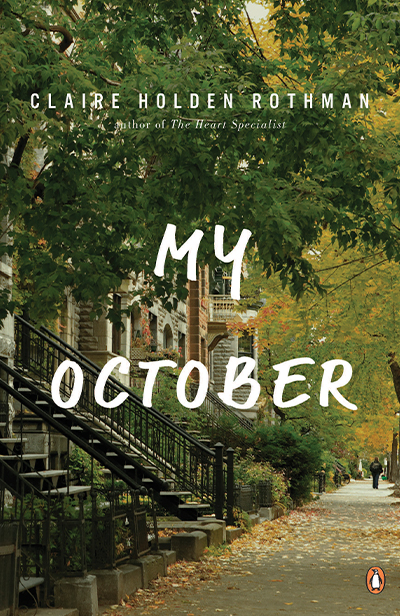
My October by Claire Holden Rothman
October 5, 2004
It’s eight in the morning. The breakfast dishes are done, the kitchen is swept, and the newspaper is already in the recycling bin. I haven’t written in my journal yet, or checked my emails. The computer isn’t even on. I’m sitting in the pantry with a cup of Japanese tea, doing nothing in particular and enjoying the silence.
Although “silence” is a bit of an exaggeration. The garbagemen are down below in the street, banging cans and shouting at one another. The living room window is wide open. It’s like summer today, even though the leaves are hanging from the trees in heavy golden clusters, ready to scatter with the first gust of wind. There is always a lull like this in October, a moment in the grim march toward winter when the foot refuses to fall. It never lasts long. A single day, perhaps two in a good year. But while the moment endures, the entire city seems to pause and take a collective astonished breath, recognizing, as if for the first time, its own beauty.
I’m alone here in the apartment, with no obligations other than to collect my garbage can after it’s been emptied and put it back on the patch of yellowing grass beneath the stairs. I’m sitting here, appreciating this fact, feeling the day and all of its possibilities opening before me, when the doorbell rings.
It’s too early for the mail. And besides, the mailman usually leaves my cheques and bills and other correspondence in the locked metal box on the ground floor. As I run toward the door, it occurs to me that I am a woman alone, but almost immediately I brush the thought aside. Luc says I should get a spyhole like the one Lyse has in the flat downstairs, but he’s overreacting. This is Montreal, after all, one of the safest cities in the world. The man standing on my welcome mat is not my regular mailman. He’s in regulation shorts and shirt, however, a special delivery man from Canada Post. He grins at me, flushed and panting slightly with exertion, and holds out a large box.
“It’s heavy,” he says in French, and then translates the sentence, just in case.
He’s not young, but he looks fit. His legs, which have just climbed sixty-seven steps, are muscular and smooth, marred only by a single protruding vein snaking down one of his calves. He places the box on the floor at our feet, and we stand together for several seconds contemplating it. Then he hands me a chit to sign. I squat, intending to use the box as a writing surface, and see the company’s name staring up at me. Beneath it is the logo — a stylized W that looks like a bird taking flight.
“What’s in there, anyway?” the delivery man asks as I hand over his chit. We seem to have settled on French, though I haven’t said a word. “Bricks?” he presses, smiling.
He’s flirting. I smile but don’t encourage him.
“Well, whatever it is,” he says, nodding in the direction of my many steep stairs, “it made me sweat today.”
I laugh in commiseration. I sweated too.
As soon as the door shuts, I go back to the pantry and get my Opinel, the penknife that Luc bought me years ago in France. I break the tape with its tip and make a long slit down the box’s middle. The carton flaps spring open. Inside are sheets of recycled brown wrapping paper and, under these, squares of bubble wrap. I pull it all out, and there they are, gleaming up at me in rows.
I pick up one of the books and run my fingers over its cover. The delivery man was right. It’s solid, brick-like. Which is a paradox, because its contents are the opposite of solid. But that, I am discovering, is the wonder of this enterprise. This book is made of words, insubstantial, weightless things I dreamed up and strung together to make a plot. Nothing at all really, and at the same time everything.
—
Excerpted from MY OCTOBER by Claire Holden Rothman. Copyright © Claire Holden Rothman, 2014. Excerpted by permission of Penguin Canada, a Penguin Random House Company. All rights reserved. No part of this excerpt may be reproduced or reprinted without permission in writing from the publisher.

All My Puny Sorrows by Miriam Toews
our house was taken away on the back of a truck one afternoon late in the summer of 1979. My parents and my older sister and I stood in the middle of the street and watched it disappear, a low-slung bungalow made of wood and brick and plaster slowly making its way down First Street, past the A&W and the Deluxe Bowling Lanes and out onto the number twelve highway, where we eventually lost sight of it. I can still see it, said my sister Elfrieda repeatedly, until finally she couldn’t. I can still see it. I can still see it. I can still … Okay, nope, it’s gone, she said.
My father had built it himself back when he had a new bride, both of them barely twenty years old, and a dream. My mother told Elfrieda and me that she and my father were so young and so exploding with energy that on hot evenings, just as soon as my father had finished teaching school for the day and my mother had finished the baking and everything else, they’d go running through the sprinkler in their new front yard, whooping and leaping, completely oblivious to the stares and consternation of their older neighbours, who thought it unbecoming of a newly married Mennonite couple to be cavorting, half dressed, in full view of the entire town. Years later, Elfrieda would describe the scene as my parents’ La Dolce Vita moment, and the sprinkler as their Trevi Fountain.
Where’s it going? I asked my father. We stood in the centre of the road. The house was gone. My father made a visor with his hand to block the sun’s glare. I don’t know, he said. He didn’t want to know. Elfrieda and my mother and I got into our car and waited for my father to join us. He stood looking at emptiness for what seemed like an eternity to me. Elfrieda complained that the backs of her legs were burning up on the hot plastic seat. Finally my mother reached over and honked the horn, only slightly, not enough to startle my father, but to make him turn and look at us.
It was such a hot summer and we had a few days to kill before we could move into our new house, which was similar to our old house but not one that my father had built himself with loving attention to every detail such as a long covered porch to sit in and watch electrical storms while remaining dry, and so my parents decided we should go camping in the Badlands of South Dakota.
We spent the whole time, it seemed, setting everything up and then tearing it all down. My sister, Elfrieda, said it wasn’t really life—it was like being in a mental hospital where everyone walked around with the sole purpose of surviving and conserving energy, it was like being in a refugee camp, it was a halfway house for recovering neurotics, it was this and that, she didn’t like camping—and our mother said well, honey, it’s meant to alter our perception of things. Paris would do that too, said Elf, or LSD, and our mother said c’mon, the point is we’re all together, let’s cook our wieners.
The propane stove had an oil leak and exploded into four-foot flames and charred the picnic table but while that was happening Elfrieda danced around the fire singing “Seasons in the Sun” by Terry Jacks, a song about a black sheep saying goodbye to everyone because he’s dying, and our father swore for the first recorded time (What in the Sam Hills!) and stood close to the fire poised to do something but what, what, and our mother stood there shaking, laughing, unable to speak. I yelled at my family to move away from the fire, but nobody moved an inch as if they had been placed in their positions by a movie director and the fire was only fake and the scene would be ruined if they moved. Then I grabbed the half-empty Rainbow ice cream pail that was sitting on the picnic table and ran across the field to a communal tap and filled the pail with water and ran back and threw the water onto the flames, which leapt higher then, mingled with the scents of vanilla, chocolate and strawberry, towards the branches of an overhanging poplar tree. A branch sparked into fire but only briefly because by then the skies had darkened and suddenly rain and hail began their own swift assault, and we were finally safe, at least from fire.
—
From ALL MY PUNY SORROWS by Miriam Toews. Copyright © 2014 Miriam Toews. Excerpted by permission of Alfred A. Knopf Canada. All rights reserved. No part of this excerpt may be reproduced or reprinted without permission in writing from the publisher.

The Ever After of Ashwin Rao by Padman Viswanathan
AT THREE IN THE MORNING,
New Delhi’s air is mostly remnants. This is its quietest hour, though the city is not still. The sounds of night business concluding, morning business being prepared, all sorts of shrouded transactions: these carry. But the air itself is nostalgic with acrid exhaust, cookstove smoke, the dying breaths of jasmine and bougainvillea breaking down into each other, night exhaling the prior day.
Please excuse: poetic lapse. I orient by smell. The night-scent excited me as I locked my door and ascended, then stopped, descended and re-entered the flat to check again: taps off, windows locked, no food anywhere. I don’t normally second-guess this way—I have many neuroses, just not this one—but I would be away in Canada for a year. I would leave my key with a fellow resident but didn’t want to leave her a reason to use it.
I locked the door again, and went upstairs to lay the key in its envelope on Vijaya’s threshold. She was a widow I barely considered a friend, particularly since she wanted to be more than that. Fetching my bag from the landing, I trotted briskly down the stairs, across the courtyard and into the carport, clicking my tongue for the cat. Dirty-orange fur, three rickety legs, strangely swollen jowls; it slunk around as though hoping to be hit.
I put out last night’s take-away, lamb biryani, at the usual spot. I had never wanted to keep a pet, but was overcome by the urge to feed the patchy creature. A memory knocked. My nephew, Anand, at six months maybe. When do they start with the pabulum? My sister, Kritika, was feeding him. She called me over—“Watch, Ashwin!”—as she lifted the little spoon toward his face and he opened his mouth, SO wide, his head bobbing a little, the eyes so serious, as though this were a contract he had agreed to fulfill: survival. My sister and I laughed until our sides hurt.
And two years after Anand came my niece, Asha.
Asha, my Asha. The child of my life. Sometimes I thought I recalled a whisper of her smell—green grapes and the pages of books; perhaps a hint of nutmeg?—but even the motion of my mind turning toward it fanned it away.
The cat still hadn’t appeared and my auto-rickshaw was waiting. “Airport,” I told the driver, no good morning necessary. He had been, for fifteen years, my favourite among those at the corner rank—almost surly, always prompt. He tossed his beedi and unthrottled his engine.
Two weeks from today, June 23, would be the nineteenth anniversary of a jet bombing that killed 326 people I didn’t know, and three I did: Kritika, Anand, Asha. It had taken nearly eighteen years to drag two perpetrators into court. Last spring, April 2003, I had gone to Vancouver to witness the trial’s start. My first time back in Canada since 1985. A Screaming Reluctance to See It had battled in me with a Driving Compulsion to See It. Guess which won?
Victims’ families, along with various other concerned parties and/or gawkers, came from all over. They milled in the grand atrium at the provincial courthouse in Vancouver, their hot, thick optimism mingling with a slight steam from the bloodthirsty and giving me … what is it? When one’s skin crawls. The heebie-jeebies.
The atrium’s high, glass walls gave the all-too-obvious image of transparency. Kafka’s trial could never happen here. Glass houses: Canadians don’t throw stones. On the government side, the excitement was both more stately and more tawdry: press releases, security expenditures, and a bullet- and bomb-proof courtroom custom-built several circles of hell underground, down where the sun don’t shine.
Only two of the many hot-air buffoons allegedly involved in the bombing were standing trial. I would name them, but what’s in a name? I try to block their faces, but they rise in my mind’s eye. Specimens. Bad examples of their community, their race, their species. Bad men.
I felt the trial to be a sham and yet I had gone to see it. Why? And furthermore, Why?
Why a sham? Because it came so very late—and after so much had changed, from the political situations that fed the bomb plot to the security situations that permitted it—that it would do nothing to prevent future terrorist acts. The accused did not regret what they had done, but neither would they plant any other bombs.
But what of punishment? you might ask. I hated those men. I might gladly have punished them with my own hands, not that I have ever done such a thing. But for the government to mete out, what—justice? Hardly. No government in the world possessed a moral scepter weighty enough to flog these puny fellows.
—
Excerpted from THE EVER AFTER OF ASHWIN RAO by Padma Viswanathan. Copyright © 2014 Padma Viswanathan. Excerpted by permission of Random House Canada. All rights reserved. No part of this excerpt may be reproduced or reprinted without permission in writing from the publisher.
Of the 2014 longlist, the jury writes:
We’re celebrating writers brave enough to change public discourse, generous with their empathy, offering deeply immersive experiences. Some delve into the sack of memory and retrieve the wisdom we need for our times, others turn the unfamiliar beloved. All are literary achievements we feel will touch and even transform you.
2014 Jury
The Scotiabank Giller Prize is pleased to announce the award-winning, three-member jury panel for the 2014 Prize.

Shauna Singh Baldwin
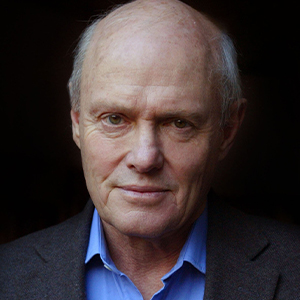
Justin Cartwright

